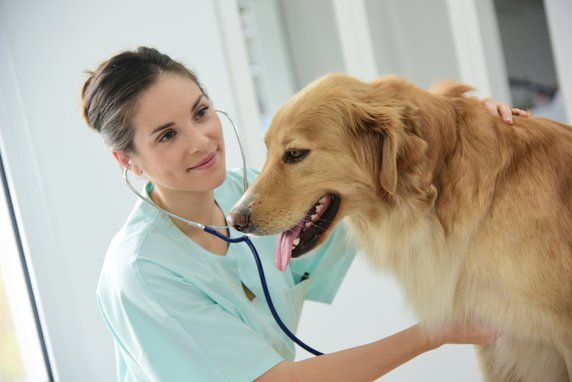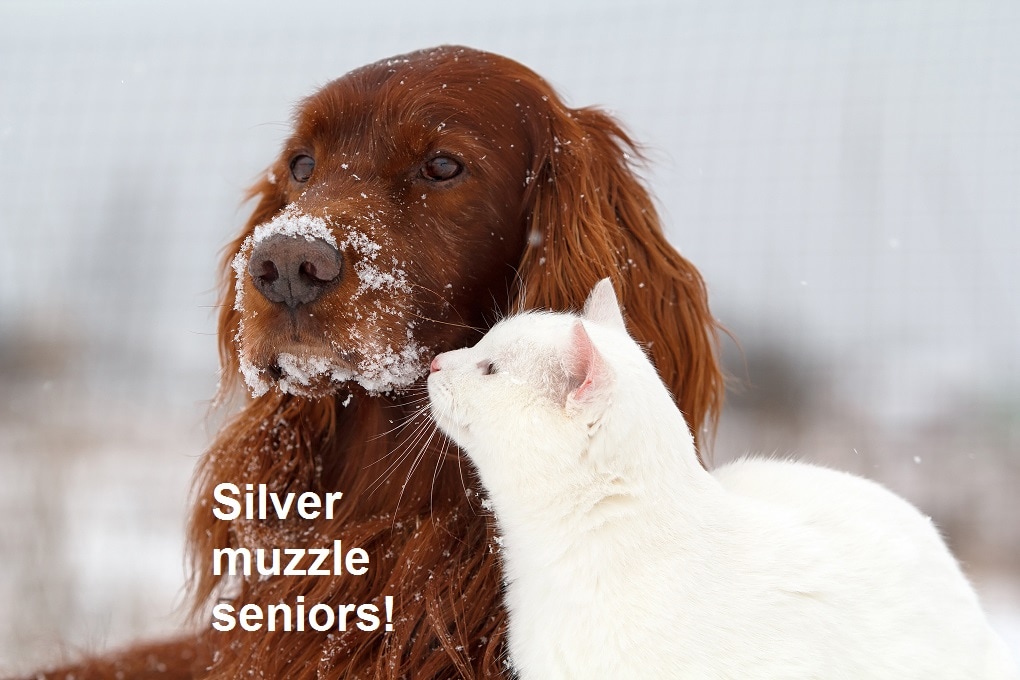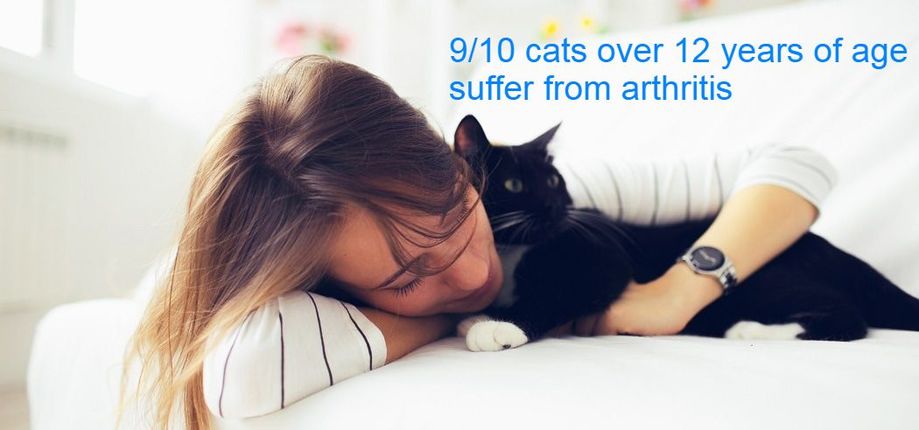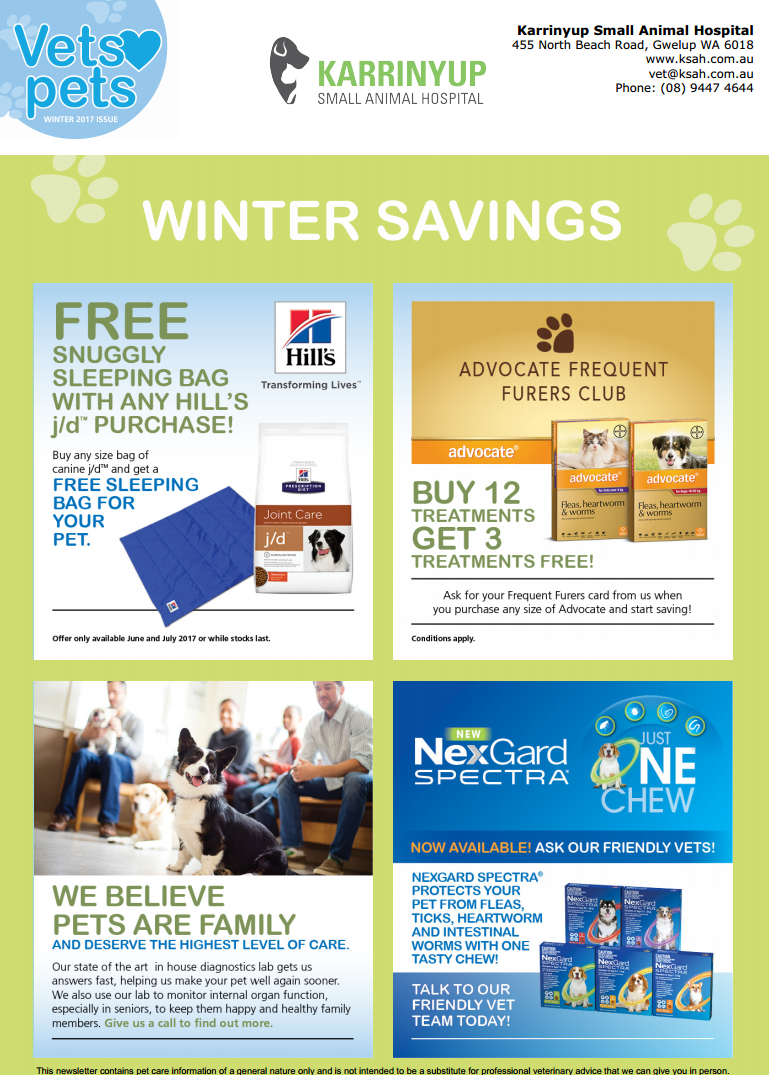Winter is here already !
Hello!
Winter can be tough on pets so we have put together some cold weather survival tips for you. We hope you enjoy reading this edition of our newsletter snuggled up warm and cosy on the sofa with your fur babies.
Did you know that dogs get Alzheimer’s too? Ageing pet medicine has seen some amazing advances so don’t worry if your dog has a few grey hairs as help is at hand.
We also look at conditions that can affect senior cats. With the new season it’s a timely reminder to think about worms. Parasites make us all squirm but don’t worry we know how to keep your pets parasite-free.
Don’t forget to check out our special offers below!
From your caring team at
Karrinyup Small Animal Hospital
Winter can be tough on pets so we have put together some cold weather survival tips for you. We hope you enjoy reading this edition of our newsletter snuggled up warm and cosy on the sofa with your fur babies.
Did you know that dogs get Alzheimer’s too? Ageing pet medicine has seen some amazing advances so don’t worry if your dog has a few grey hairs as help is at hand.
We also look at conditions that can affect senior cats. With the new season it’s a timely reminder to think about worms. Parasites make us all squirm but don’t worry we know how to keep your pets parasite-free.
Don’t forget to check out our special offers below!
From your caring team at
Karrinyup Small Animal Hospital
Our pets are living longer, better lives than ever before thanks to advances in veterinary care. Pets do age faster than humans though so we recommend twice yearly check-ups. It’s especially important for dogs and cats over 7 as this helps us to spot anything and take action if need be before it becomes a problem. Thanks to new blood tests we can quickly check how well your pet’s organs are performing just like your GP does and sometimes with faster results!
As pets are living longer we are seeing more canine cognitive dysfunction - also known as ‘dogzheimers’ or ‘doggy dementia’. Cats may also develop this condition and we sometimes hear owners telling us about disorientated cats who are very vocal and seem to have day and night confused!
As pets are living longer we are seeing more canine cognitive dysfunction - also known as ‘dogzheimers’ or ‘doggy dementia’. Cats may also develop this condition and we sometimes hear owners telling us about disorientated cats who are very vocal and seem to have day and night confused!
|
Could it be ‘dogzheimers’?
Give us a call - we are here to help pets of all ages. |
Winter Survival Tips:
|
|
‘Grumpy Old Man’ syndrome? Your dog could have arthritis – it’s very common, 1 in 5 dogs in Australia do. If your dog lags behind on walks, is slow to get up, needs help getting into the car, finds stairs more of a challenge, is less keen to play or is just plain grumpy we can help! Just like with humans arthritis can be painful and keeping your dog moving can be a challenge. Weight control and exercise are important in the management of arthritis and often we prescribe food as treatment for joints and to help reduce calories! Easy to give medications and supplements can also help ease the pain of arthritis and promote joint health. |
Good vibes!
|
There is nothing nicer than having that happy feline friend come purr next to you. They might not be able to talk but they can tell you when they are happy. If they aren’t their usual happy selves it pays to find out what’s going on and act quickly.
Five feline signs to watch out for:
If your cat is displaying any of the signs listed, it could be a sign of osteoarthritis. 9/10 cats over 12 years of age suffer from arthritis. Please give us a call to arrange a check-up. If it does turn out to be arthritis, don’t worry, we have easy to give pain relief medication and foods that help look after ageing joints. We can’t promise to turn back the clock to kitten days again but we can help your senior cat feel more comfortable and enjoy more purrs with you. |
Kidney care Kidneys are essential organs, they remove waste from the bloodstream and regulate fluids in the body. When kidneys aren’t working as well as they should, the result can be life threatening. Many factors affect kidney function and while genetics play a part, so does dehydration, shock, poisons, infection, blockages and trauma. Please only give your cat medications that we prescribe as some common medications can cause serious kidney problems. Kidney problems can happen suddenly or slowly progress over time. Signs of chronic kidney disease don’t often show up until almost 2/3 of the kidney have been affected and then a special diet is very important in managing the disease. Often with sudden or ‘acute’ onset kidney disease cats can recover completely with our care and special diets. If your cat experiences any of the following signs, please call us as it could be kidney disease:
|
Worms! These nasty parasites live inside your pet and could even put your family at risk
Parasites have evolved over the years to become very good at what they do – reproducing and take nutrients from their host. They often have complex life cycles with immature stages such as larvae and multiple hosts. Think of the butterfly life cycle but without such a beautiful end result!

There are 2 key types of worms:
1 Intestinal worms – these live inside our
pet’s guts for part of their lifecycles and
some can pose a threat to human health.
Four main types of intestinal worms are
hookworms, roundworms, whipworms and
tapeworms (Ringworm isn’t a worm it is
actually a fungal skin infection!).
2 Heartworm – which is transmitted
by mosquitoes and the adult worms
live in the blood vessels of the heart.
‘Allwormers’ do not protect against
heartworm. Prevention is easy just give us
a call to make sure your pet is safe from
deadly heartworm.
1 Intestinal worms – these live inside our
pet’s guts for part of their lifecycles and
some can pose a threat to human health.
Four main types of intestinal worms are
hookworms, roundworms, whipworms and
tapeworms (Ringworm isn’t a worm it is
actually a fungal skin infection!).
2 Heartworm – which is transmitted
by mosquitoes and the adult worms
live in the blood vessels of the heart.
‘Allwormers’ do not protect against
heartworm. Prevention is easy just give us
a call to make sure your pet is safe from
deadly heartworm.
|
Intestinal worms steal nutrition that our pets need to keep their bodies healthy. Worms pose a real threat to young animals – often puppies have roundworm passed onto them before birth by their mothers. That round belly we love to pat might not be just puppy fat!
Infected animals often shed worm eggs into their environment via their faeces – many can only be seen with a microscope so you may not know your pet carries worms. Signs of intestinal worms in pets:
worming medications doesn’t help and prevention is really the best option. Worming your pet is easy to do so please don’t put your loved ones at risk. Get some pet worm tablets today. |
To keep your pets and family healthy:
|







